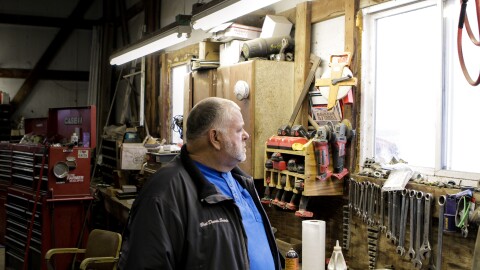The last time I visited Bret Davis' farm in Delaware County, earlier in the spring, I was asking him about . It was raining then, and it was wet and rainy when I spoke to him this week, too.
"It was terrible yesterday," Davis says. "It’s the worst conditions I’ve planted in. I mean, I shouldn't have been there, I really shouldn’t have."
Farmers in Ohio and many other parts of the country are rushing to get their crops planted after a long, wet spring. The late start means many acres intended for corn won’t get planted, and farmers are running far behind on soy beans as well.
Davis and his team were out past 1 a.m. the night before trying to get seeds planted ahead of more rain. He's two-thirds done with corn, and about a third of the way through his soybeans. He's still pretty optimistic they'll be able to make up for lost time, but Davis is realistic about this year's crop.
"A corn plant and a soybean plant is nothing but a solar panel," he says. "It takes every bit of sunlight it can and the nutrients to make what it does, and when we're a month behind, you've cut a month of growing out of a season that’s fairly short to start with."

The USDA's paints a stark portrait. Across the state, Ohio farmers have only planted a fifth of their acreage intended for soybeans. By this time last year, they'd completed 80%. Farmers are further along with corn—planting slightly more than a third of what they did last year.
But farmers have also passed the cut-off for federal crop insurance. Anything they plant after June 5 gets steadily less coverage.
A few miles away, Ryan Rhoades has about 80 acres left to sew up the last of his planting, and he notes they’ll probably plant past the deadline.
"Let’s see, we put nearly 300 acres in in the past two days," Rhoades says. "That would’ve been Tuesday and Wednesday. So we really made a big push on some ground that maybe we shouldn’t have, but the acres are planted and we’ll see what happens with germination."
The late start on planting is only contributing to an already stressful situation. In addition to the ongoing trade war, a report from the Federal Deposit Insurance Corporation (FDIC) shows an uptick in people falling behind on farm loan payments.

Brian Ricker, CEO of the lending co-op AgCredit, isn't raising alarms just yet.
"We haven’t seen that quite as much within our portfolio," Ricker explains. "Our delinquencies are a little higher than what they were a few years ago, but they're still very, very manageable. And overall, the lenders and the banks and the farm credit system are very well capitalized."
It's been a bit drier south of Columbus on Scott Metzger's farm, but like Davis and Rhoades, he's been rushing to catch up.

"We started in and had about a five, six-day window to Memorial Day there and ran pretty hard those days and were able to get quite a bit done in that amount of time," he says. :So we’re just down to a little bit here left. So we should, end of the day, get finished up with what we have."
Metzger's farm is done with corn, and they're finishing up on beans, too. He takes me to their last field, where his cousin Blake is running the planter. Even here there are broad swaths of standing water cutting across the rows.

"This bank you can plant close to the water," he tells Blake. "That one running through the middle of the field you won't be able to get as close, and on the other side of that, you won't be able to get as close either."
Despite the late start and the late nights catching up, Metzger, Rhoades and Davis are all thankful to be squeaking in close to the deadline. All three have heard from farmers in Northern Ohio who haven't even begun planting.
Those farmers can get limited compensation through federal crop insurance. Metzger thinks in the Midwest, the number of people filing those Prevented Planting claims could reach a record this year.






